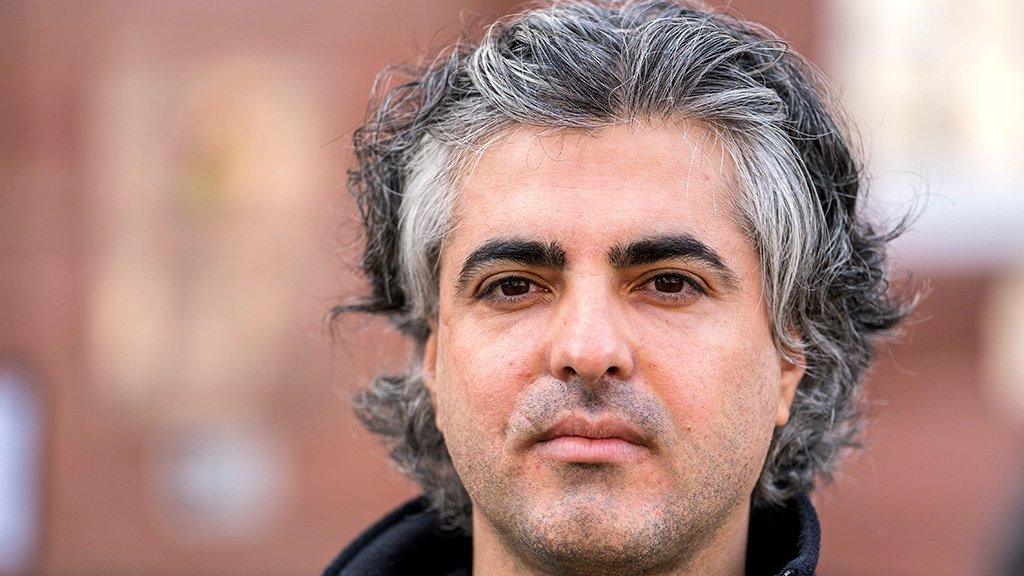Refugees in Wales: 'Thank God I came here after our home was bombed'
- Published
The family spent five years in a refugee camp after fleeing the war in Syria
After 15 years of building it, Khaled Muha could not believe the horror when his dream family home was obliterated by a missile attack just two months after he had finished.
Five challenging years living in a tent in an Iraqi camp for Syrian refugees followed, before a 3,000-mile trip into the unknown to a new life somewhere in the UK.
Following a three-hour minibus journey after landing in Britain, the family finally stopped outside a three-bedroom semi-detached house in west Wales - and four years later they are proud to call it home.
Now the scenes of refugees fleeing Ukraine are almost too painful to watch for father-of-three Khaled and wife Fatima - because 10 years ago, in a different war, they were in the same position with the Muha family desperate to find safety as the bombs rained down.
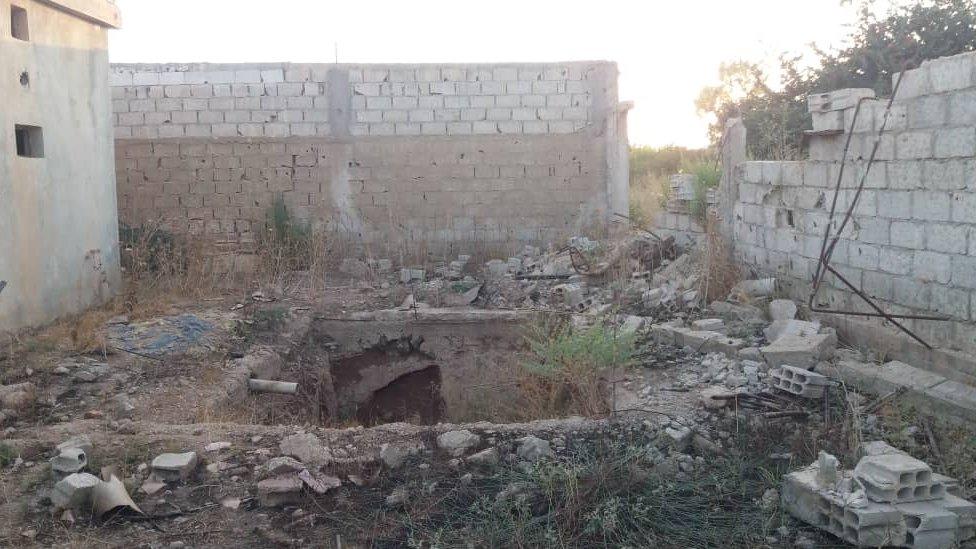
The Muha family home was caught in the crossfire and destroyed in the Syrian Civil War
Exhausted by a decade of suffering, the family could be forgiven for wanting time to reflect and finally enjoy the quiet life in rural Carmarthenshire.
Yet having fled Syria's civil war, the 47-year-old is grateful for the chance to start again and wants to make up for lost time.
None of the family spoke any English when they arrived in the UK in 2018 but while their three sons go to local schools and colleges, Khaled and Fatima attend English lessons and volunteer at the local Oxfam shop.
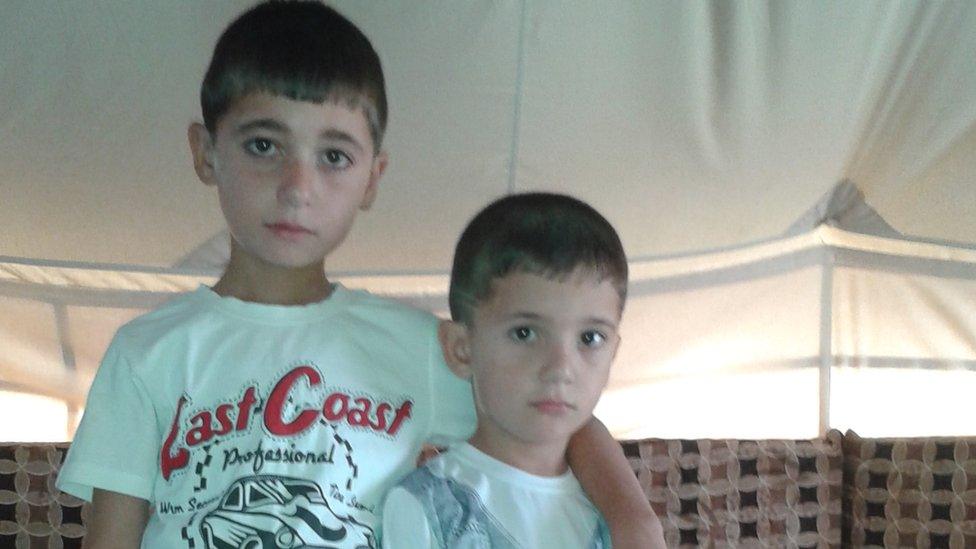
The youngest Muha boys Sardar and Hasan in their team at the Kawergosk at Erbi in northern Iraq
Not satisfied with that, former farmer Khaled - a one-time mature law school student and primary school teacher - wants to train as a nurse in Carmarthen, to give back to the community that have welcomed his family.
"A new life for us, with good people. We would like to stay here," Khaled says slowly as he searches for the right words in a language he is still trying to learn.
"We need to stay in Wales. Welsh people are very quiet and friendly and we are very comfortable.
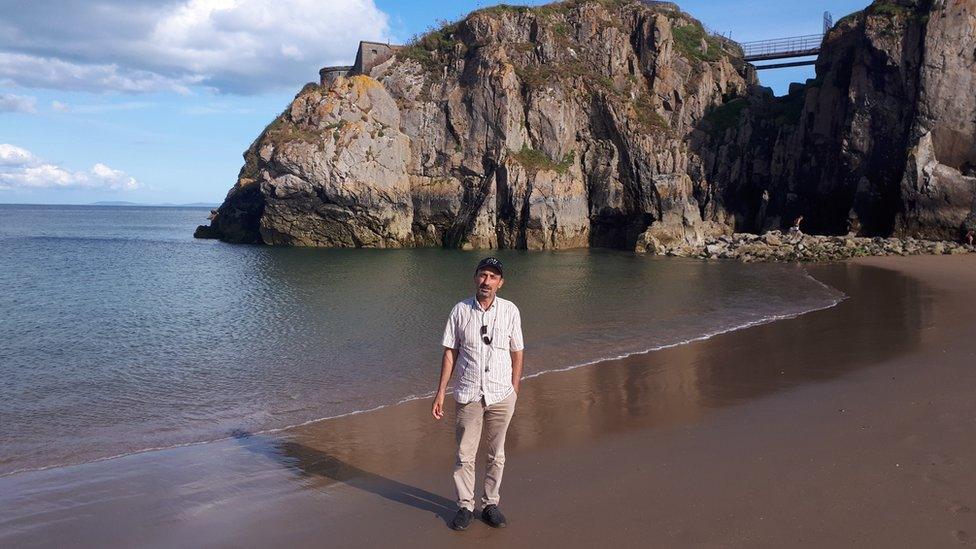
Khaled Muha's postcard from Wales is one of hope and a bright future for his family
"The schools are very high level and the teachers here are perfect. For me, I think here is a good place."
With the UK preparing to welcome refugees from the war in Ukraine, the memories have come flooding back for Khaled.
And the Muha family are keen to show how a loving community can help people in time of crisis but also how refugees can help enrich communities.
Their rented council home is immaculately clean and tidy and as the boys arrive home from school, Fatima serves tea and handmade baklava and harisi - a Syrian semolina cake - which she has prepared in the kitchen.
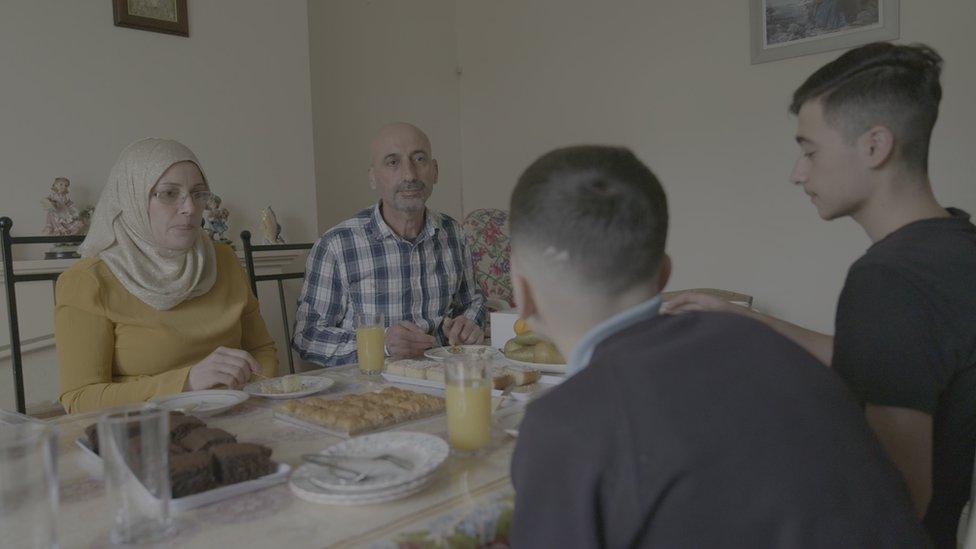
The Muha family can enjoy a peaceful tea-time all together
It is a place where Fatima and Khaled can finally provide stability after a decade in which their lives have been turned upside down.
Family home dreams destroyed in Damascus
Before the war, Khaled had a busy life in Damascus. Originally from Kurdistan in the northern part of Syria, he moved to the capital in the 1990s to find work and study.
He was not well off but Khaled worked multiple jobs to provide for his growing family.
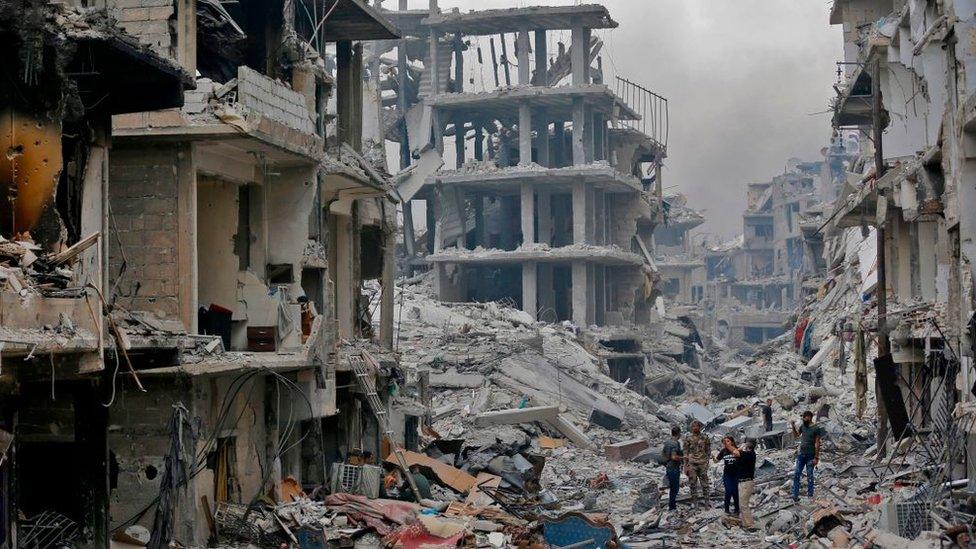
Khaled Muha had to get his young family out of Damascus when the Syrian civil war escalated
His main employment was as a farmer, planting fruit trees that produced apples, olives and other produce to sell at market. He also taught at a primary school in the city.
But Khaled also dreamed of making a better life. After marrying Fatima, he enrolled at the university law in school in Damascus as a mature student, studying for four years before the war came.
He spent his hard-earned money building a house on a piece of land which he hoped would be home to his wife and sons for many years.
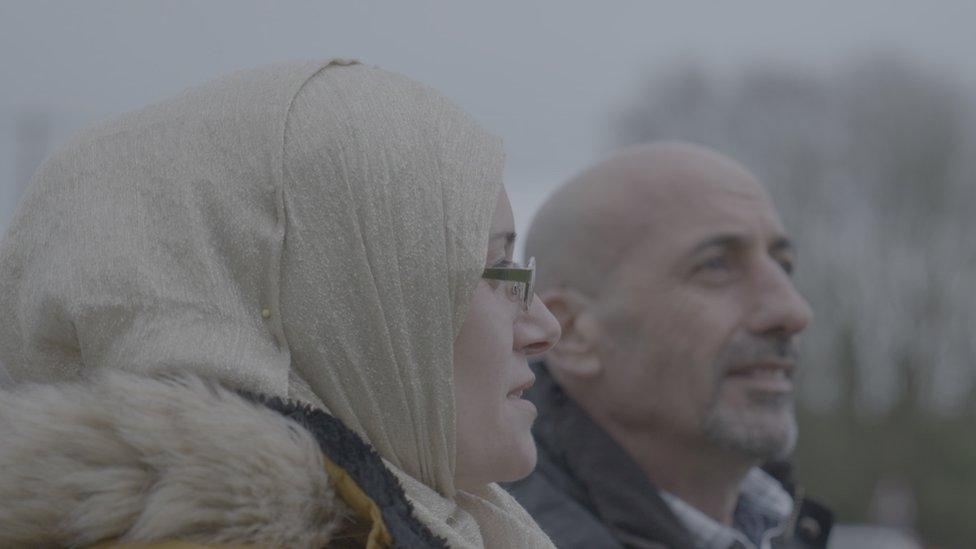
Khaled did many jobs while in Damascus to support his young family
It took 15 years of hard work and savings before it was ready for the family to move in.
But they were only able to live there for two months before war forced them to flee the city and their house was bombed with rocket launchers and looted. Everything they owned was taken.
The home they had set their heart on for years lay in ruins and so did their plans for the future.
From capital city to refugee camp
After leaving Damascus, Khaled and the family retreated to Qāmishli, in the Kurdish area in northern Syria where he grew up.
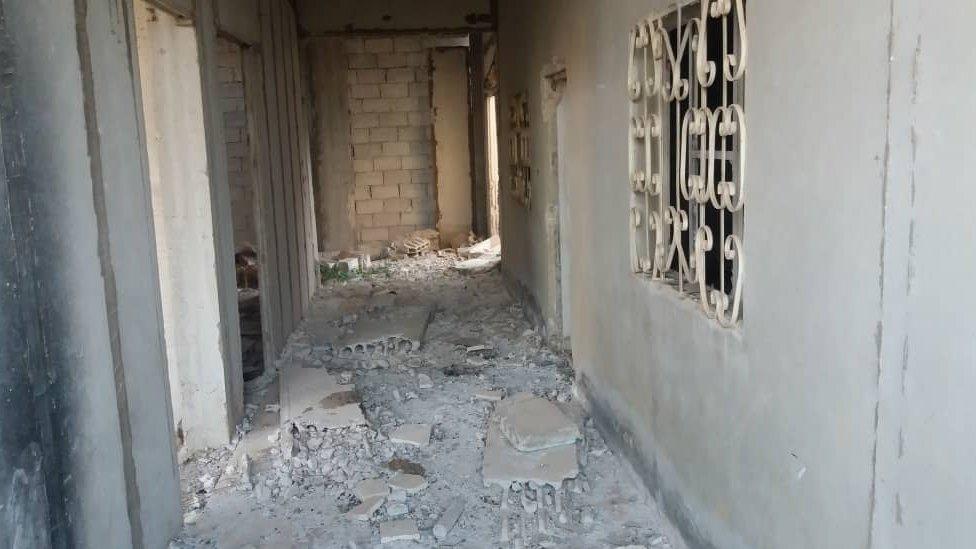
Khaled spent all of his money on building their house in Damascus but it was destroyed by missiles with two months
They only stayed six months and as the fighting intensified, they were forced to move again - crossing the eastern border into Iraq with thousands of other homeless refugees.
The government of Kurdistan-Iraq set up a refugee camp called Kawergosk at Erbil in Northern Iraq and it became home to 18,000 people.
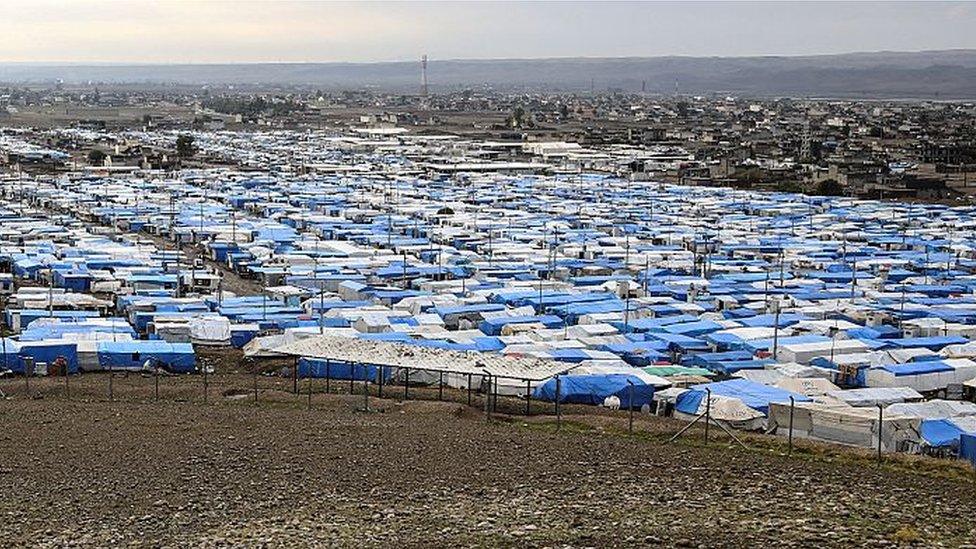
The Muha family lived in Kawergosk refugee camp for five years, which had a population similar to the Welsh seaside town of Aberystwyth.
Fatima said it was hard to care for three young children in cramped and dirty conditions in a one-room tent, cooking food, washing clothes and changing nappies in the same small space where they slept.
She also feared for their safety.
"In the camp, I am always worried about my children," Fatima, 46, told BBC Wales Live.
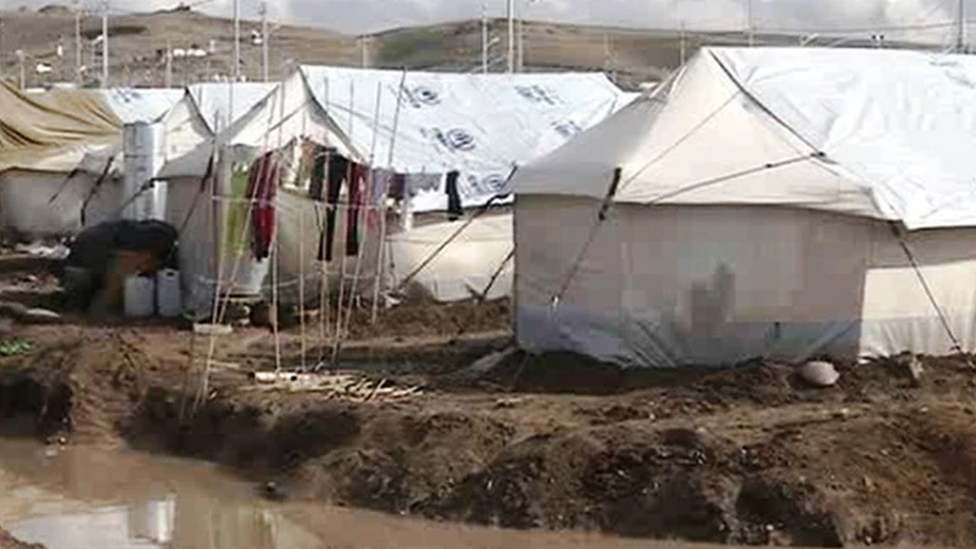
The family lived in this one-room tent - address H10 - for five years at Kawergosk refugee camp
"They were so small. All the time, I look for them. Every time I said, 'please be careful, don't speak' because we are all together with 3,000 families. Some are friendly and quiet, others were bad."
Khaled says it was a miserable existence, despite relief agencies efforts to provide some basic services.
"I know the camp is not good and not clean," he said.
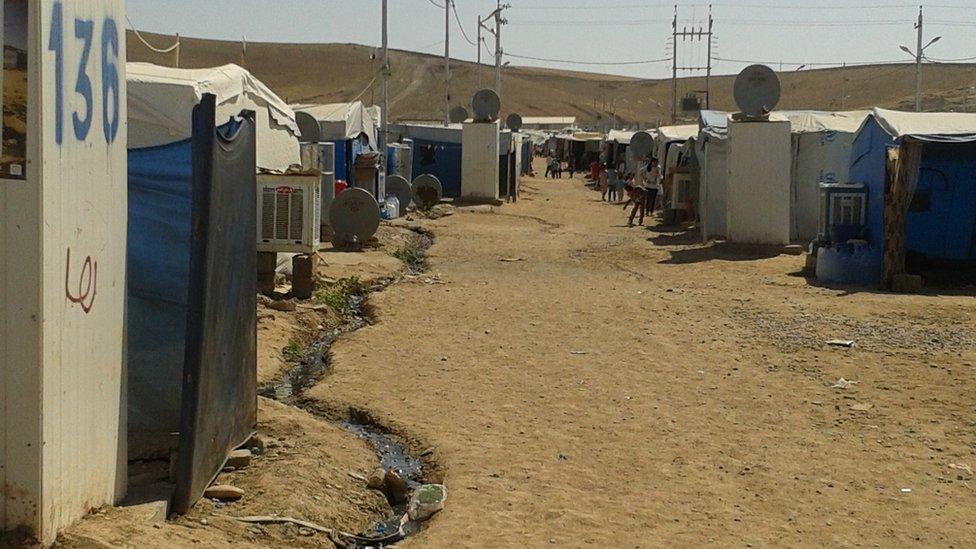
Fatima was worried about her children's safety at Kawergosk refugee camp in northern Iraq
"But we tried to build a community with my neighbour on my left and my right. It was a hard life as we meet and cook together and speak about everything.
"The women cried because when they move from Syria, they leave everything - the house and memories.
"To stay under a tent for five years, that's a very difficult life. The winter is very wet - the rain is always coming in the tent. Then the summer is very hot.
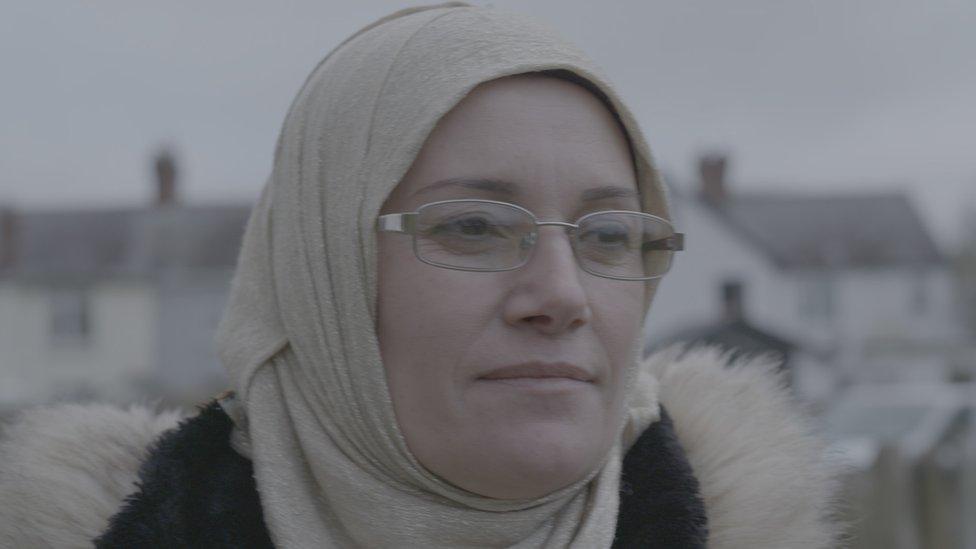
Although they made friends, Fatima was glad the family left the refugee camp
"I remember sometimes the wind coming into the camp. That's very horrible for the children. They were scared and it was very dangerous in a tent with just one pole. We tried to hold onto it so it didn't fly away."
Humanitarian agencies helped to provide basic services, including some education for the children, although Khaled says his children did not learn anything during their five years in the camp.
Khaled, though, volunteered with medical charity Medecin Sans Frontieres, external to help provide basic medical services.
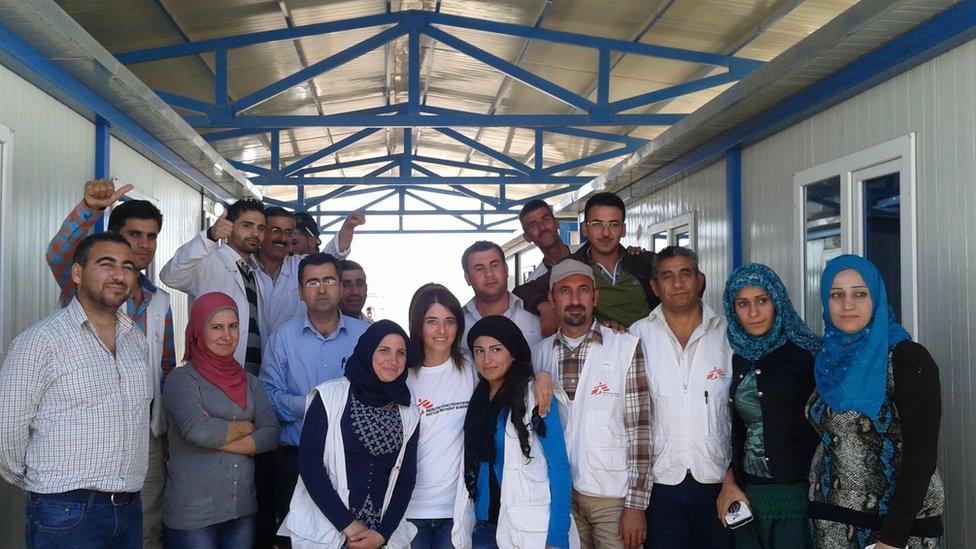
Khaled volunteering for Medecin Sans Frontieres has given him the inspiration to become a nurse in Wales
But with no prospect of moving back to Syria - and with no desire to stay in the camp for a day longer than necessary, Khaled started to look for options to move to another country.
Journey into the unknown
But until the last minute, he didn't know it would be Wales.
"Someone called me on the phone and asked me my name, the names of my family and if I wanted to go to Canada. I said 'OK. No problem'," he recalled.
Khaled thought his future may lay in north America, but despite that phone call, no firm plans were ever agreed.
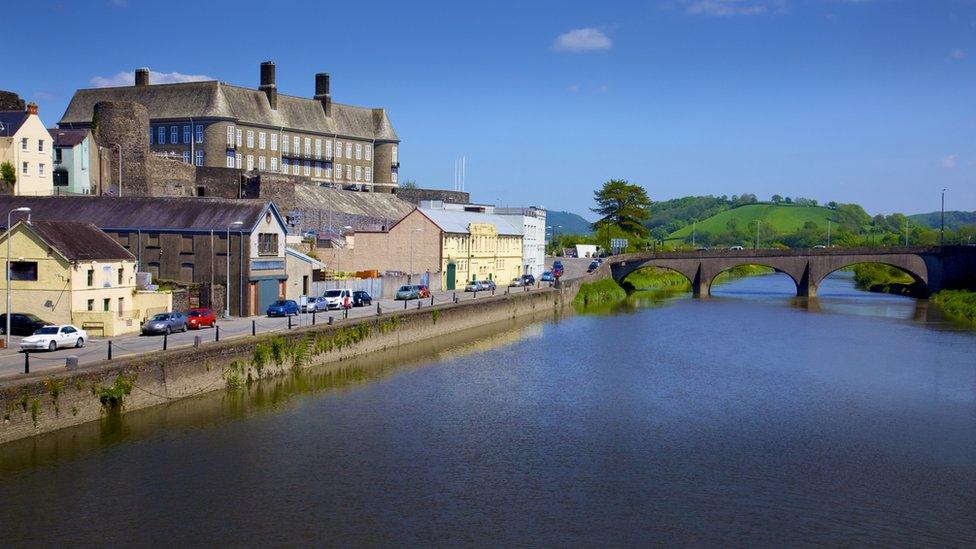
From the war-torn middle east to west Wales, the Muha family have found a new home in rural Carmarthen
Then, out of the blue, another option emerged.
"They asked if I wanted to go with the British, the UK. I said 'yes and thank you'."
This time, the plan came together - it turned out to be meticulously organised.
On 15 March 2018, they boarded a flight from Iraq to Bristol where they were welcomed by British officials at the airport and taken by minibus across the Severn Bridge, along the M4 and into west Wales.
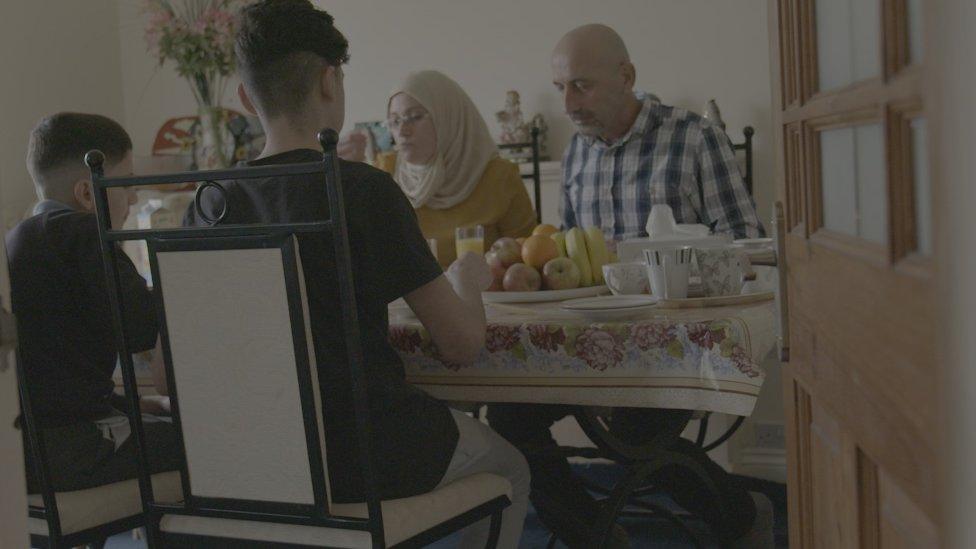
The Muha family have been overwhelmed by the warm welcome they have recieved in the UK
They were dropped off at the rented house on the edge of Carmarthen where they still live today.
For the first time in years, they felt secure and free.
"When we arrived here, I thought we will maybe go to a hotel," said Khalid.
"I didn't think we would come to a house - that was new to us after five years in a tent."
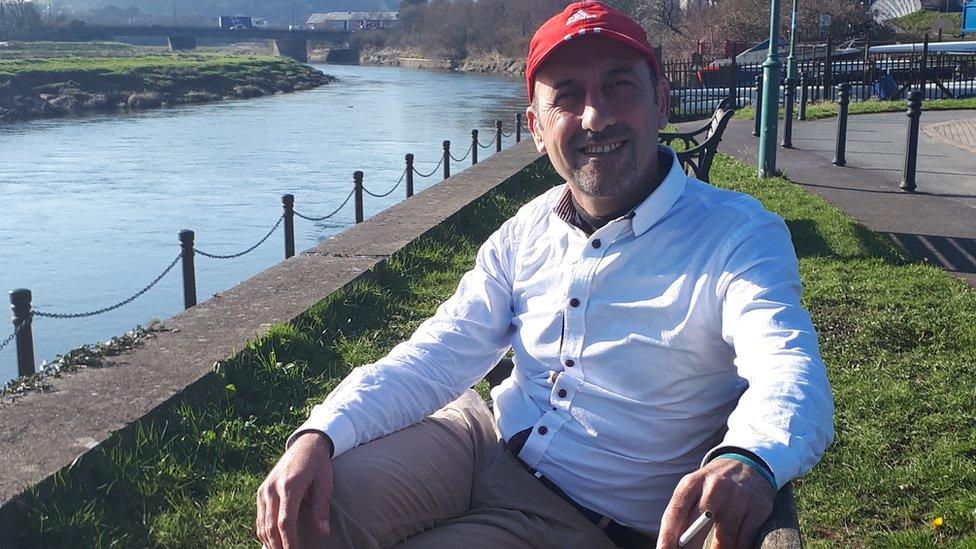
Khaled Muha has a new lease of life since moving to west Wales and wants to make the most of his second chance
"We felt safe. When you have a house, you feel comfortable; you sleep very well; you can cook and wash."
It was a far cry from how they had lived in the refugee camp.
Latest figures show that Carmarthenshire has taken more refugees than any other Welsh local authority.
Home Office data shows from January 2014 to February 2021, 20,319 people were settled in the UK under the Vulnerable Persons Resettlement Scheme, external, designed for refugees who had fled the war in Syria.
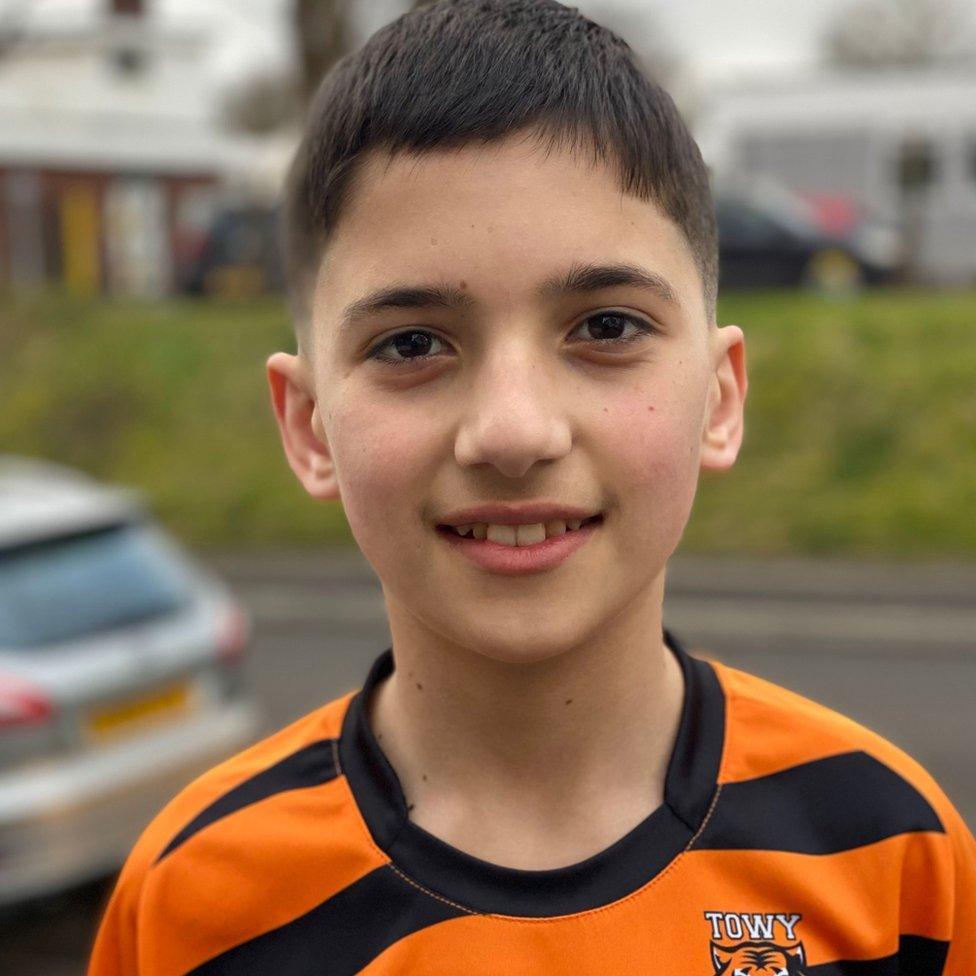
Youngest son Hasan plays for local football team Towy Tigers
Of those, 1,331 or 6.6% came to Wales - with Carmarthenshire taking 163 refugees.
Support staff, based in Swansea, helped the family with basic information about where to find hospitals and schools. But they still felt like strangers in a strange land, with no friends, no knowledge of the local area and barely a word of English.
"I was worried," Fatima now admits.
"I said 'maybe when we go, the people may say 'you're not welcome'.
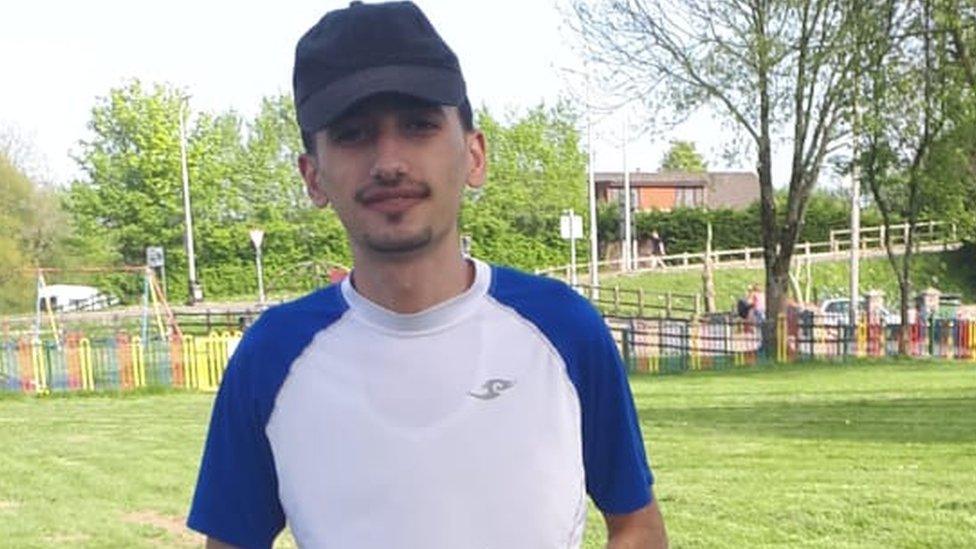
All three Muha boys love playing football and the eldest Waleed also enjoys going to college
"But when we came, it was different. I remember people coming to visit us. A women called Helen came and she said: 'If you need anything, just phone me'.
"She couldn't come every day so she sent a friend Bronwen and her husband to come to sit with me. She said she would come every week. She is very friendly. They brought bicycles for the children. Now she is the same as my family.
"I say thank you to God because I come here.
"I could not see it when I moved because a different country and different language was difficult. But people here are not fearing us. We come here and they are helpful to us."
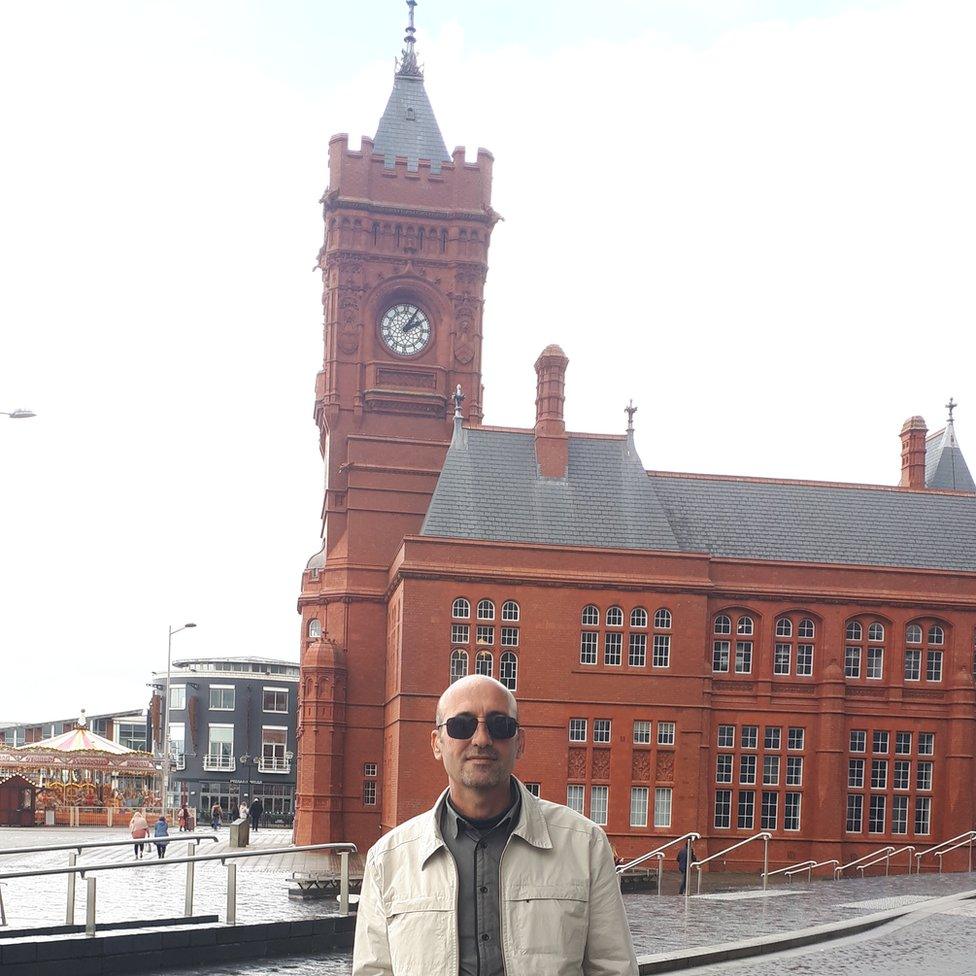
The Muha family are trying to learn English as quick as possible and Khaled likes immersing himself in the Welsh culture
Khaled agrees that it is the connection to ordinary local people that has made the biggest difference.
"They help us with information about Carmarthen and the countryside and they give us things," he said.
"Always they speak English and we are learning.
"When you speak to anyone in the street, they are very friendly and helpful. They say 'hello, hello!' and they smile. You can ask anyone for help. For that, we feel quiet and peaceful."
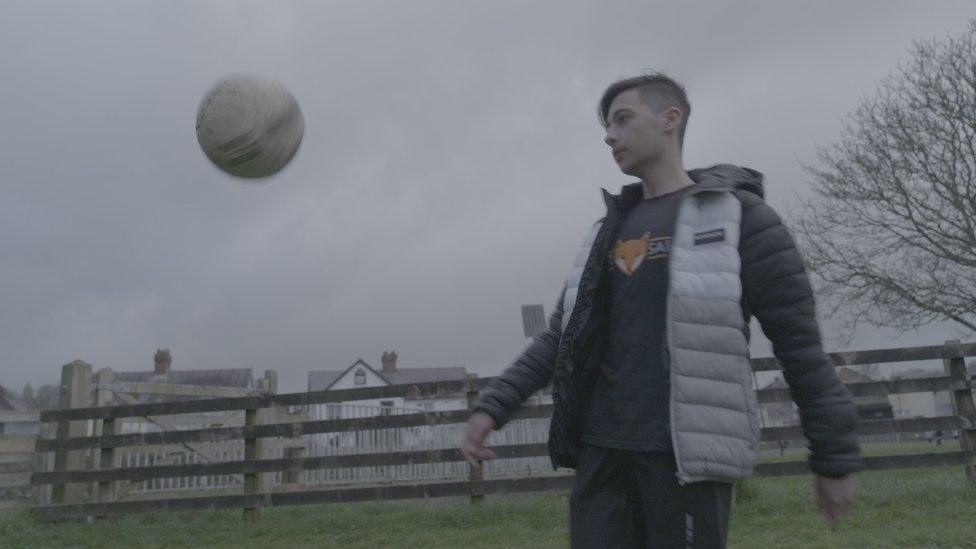
The Muha boys love the amount of opportunity they get to play football in Carmarthen
Carmarthen is where they see their future, and they want to show their gratitude to the town that has embraced them.
Khaled, whose experiences in the refugee camp in Iraq have deepened his interest in a medical career, volunteered at the nearby Covid vaccination centre during the pandemic.
The couple are looking forward to a "great future" for their sons.
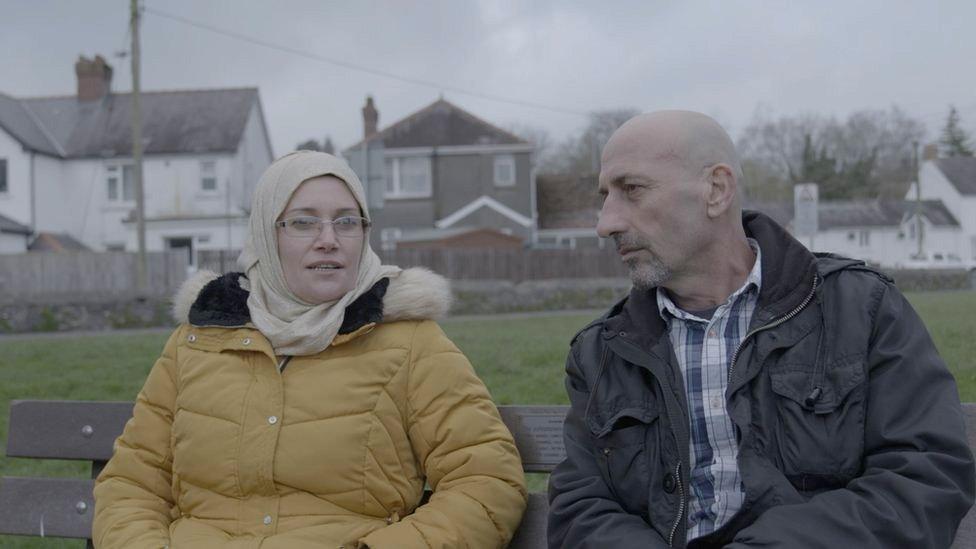
Khaled and Fatima enjoy volunteering at the local Oxfam shop as they try to learn English
"If they need to study to be a lawyer or doctor or teacher they can," says Fatima.
Waleed, 18, is the eldest and he is studying hairdressing at Coleg Sir Gâr in Llanelli while 15-year-old Sardar, who wants to be an engineer, goes to the local comprehensive school where his friends are interested to hear about his life.
"They think my life is very hard," he said.
"They see the news and stuff. They say 'hi' to me in Arabic and Kurdish. They teach me English and I teach them Arabic and Kurdish.
"When I was in Syrian camp, it was very hard and felt bad. When I came here, my life changed.
"Life in Carmarthen is so good. I have my neighbours, my friends and when I have free time, I come here and play football with them."
The youngest of the football-mad brothers is 11-year-old Hasan who is in his final year of primary school and plays for local team Towy Tigers.
"I've got lots of friends and we play together," he said.
"Here is very nice, easy to make friends and talk to people."
For a family that has experienced and witnessed so much suffering, there seems to be no bitterness. The thing that Khaled mentions most is gratitude and a desire to give something back to Wales, the country that he now calls home.
"Thank you to the government, to the people, for Universal Credit - they help us with everything," he said. "Thank you to everyone."
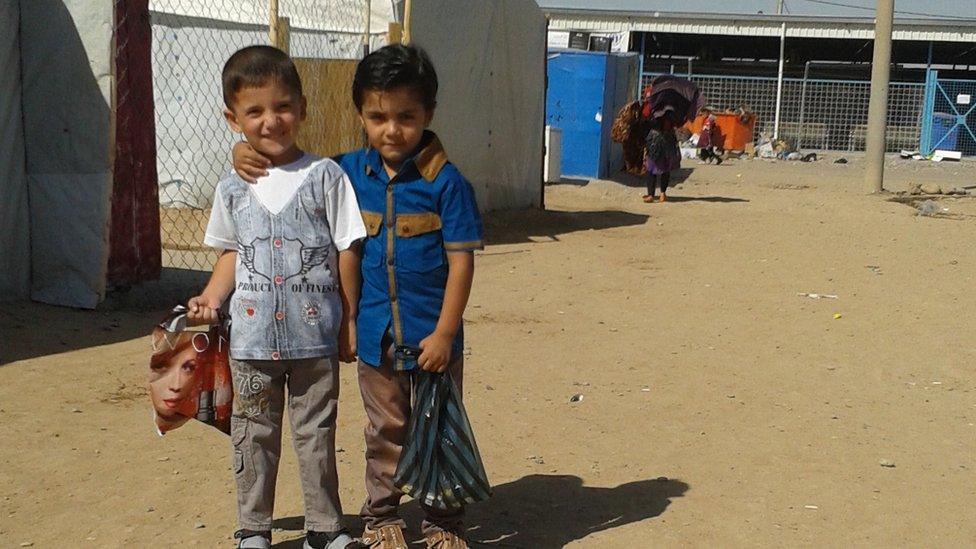
The youngest Muha child Hasan with his friend Mohammad who still lives in the refugee camp in northern Iraq
He says his experience is mirrored by other refugee families he has met in Carmarthen.
"Always when we talk, they are happy," he said.
"They always say this is a place for a good life. They are happy with jobs and children's schools. I didn't see anybody who didn't like Wales."
For more on this catch-up with Wales Live on BBC iPlayer
- Published2 May 2023

- Published29 January 2022
